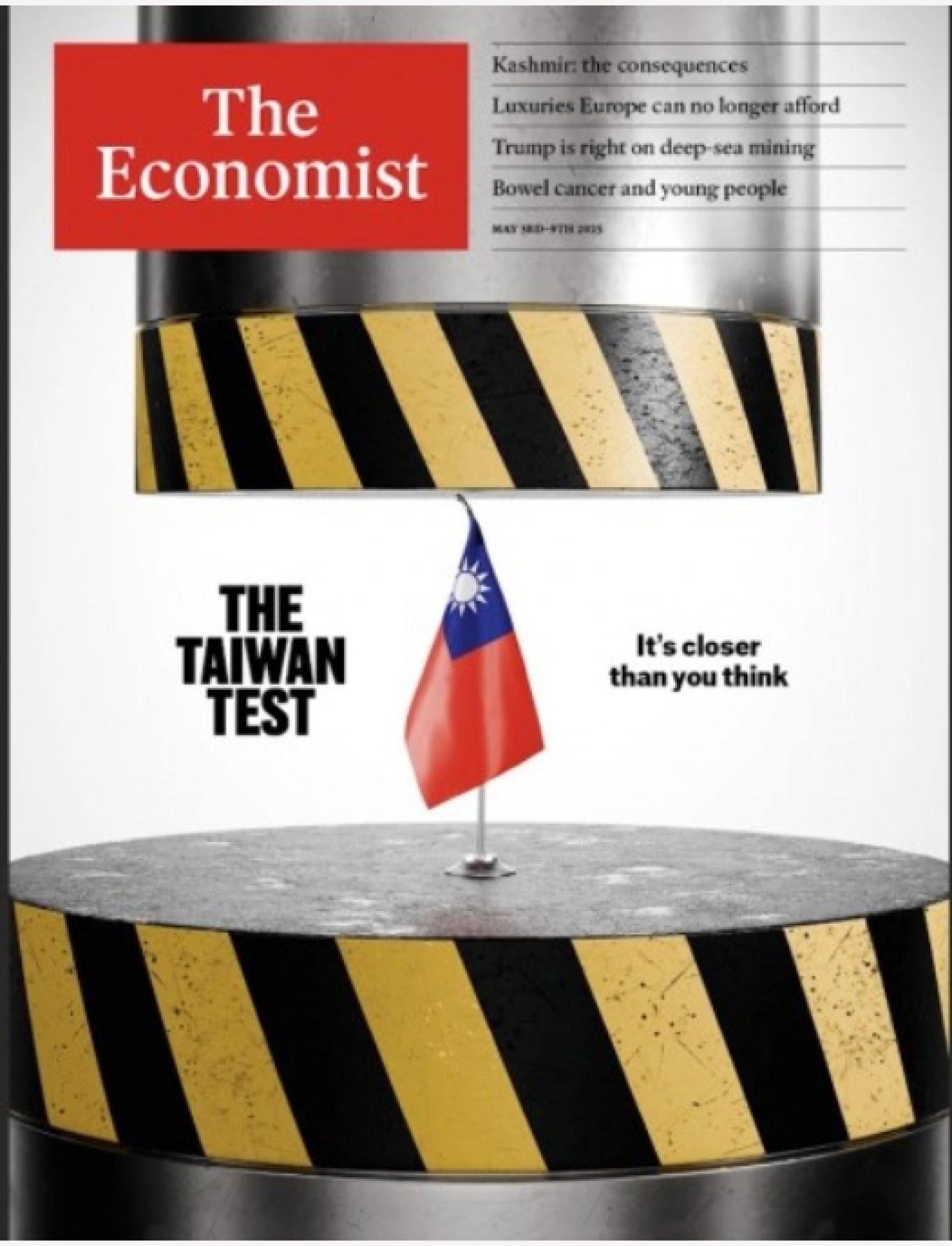
Why the Economist's Report Unsettles the DPP
By Wu Tien-jung, The Storm Media, May 8, 2025
Taiwan once again landed on the cover of The Economist, with the latest feature story highlighting the island’s dilemma caught between the U.S. and China. While it's true that Taiwan’s politics are highly polarized, The Economist’s claim that such division is hindering President Lai’s government from increasing defense spending, reducing dependence on imported energy, and preparing for crises echoes the Democratic Progressive Party’s (DPP) long-running narrative warfare—and even misrepresents facts.
Take the claim that opposition parties significantly slashed the defense budget: in reality, this year’s defense budget was reduced by only NT$4.6 billion—less than 1 percent. Of that, NT$4.5 billion was the quotation price difference of a specific weapons procurement program (Project Owl), and the cut was supported by both the ruling and opposition parties. In essence, only NT$100 million was actually slashed. Moreover, the NT$74.4 billion in budget “freezes” is not the same as a cut — this year marks the smallest defense budget reduction in a decade.
As for the claim that the opposition is obstructing efforts to reduce energy dependence, it’s hard to know where that comes from. According to Taiwan’s Ministry of Economic Affairs, the current natural gas reserve stands at only 8 days — a dangerously low buffer, even in peacetime. Blackouts have become increasingly frequent, let alone the challenges posed by war or the high energy demand from developing AI industries. Yet President Lai is moving forward with the plan to phase out nuclear power, with Nuclear Plant No. 3’s second reactor scheduled for decommissioning on May 17. This is despite growing public support for nuclear energy. The DPP chooses to appease its anti-nuclear base rather than consider national defense imperatives — ignoring U.S. suggestions to reconsider nuclear power. Meanwhile, the opposition has proposed legislation to allow for extending nuclear energy and is also preparing a referendum to keep the option alive.
Why do foreign media continue to buy into — or even embellish — these falsehoods? Another example from The Economist cites KMT caucus leader Fu Kun-chi’s meeting with Chinese official Wang Huning in April 2023, and then accuses the KMT of pushing “power expansion bills” to weaken the presidency. The timeline alone debunks any causal link. What the DPP and The Economist label “power grabs,” the opposition calls “congressional reform” — originally a campaign pledge by 2024 presidential candidate Ko Wen-je of the Taiwan People's Party, which holds only 8 seats and sought an alliance with the KMT. Ironically, these very reforms were once proposed by the DPP when they were in opposition. Who could have foreseen the DPP’s current scorched-earth resistance to its own past ideals — all to Xi Jinping’s delight?
The opposition has prioritized legislative reform to address the historical problem of a weak legislature unable to hold the executive accountable. From hearings and investigative powers to penalties for contempt of Congress, the proposed reforms are modeled on U.S. congressional practices and based on the principle of separation of powers under a semi-presidential system. Congressional empowerment is a given in the U.S., but when Taiwan’s opposition attempts the same, it’s branded “wishful” or “pro-China.”
Despite The Economist’s report aligning perfectly with the DPP’s usual information warfare, the ruling party still took offense this time.
Why? Because the DPP relies on two key narratives to maintain power: first, portraying opposition oversight as destabilizing and pro-China — a claim The Economist seems to accept. Second, fostering unshakable faith that the U.S. will always back Taiwan. All major parties in Taiwan are pro-U.S., but the DPP has turned pro-Americanism into a kind of religion, branding any skepticism as heresy — or worse, pro-China. The irony is that this blind faith in the U.S. has made the DPP its own biggest victim.
Under Biden, U.S. support has been more talk than action. Under Trump, Taiwan was hit with a triple blow: the exodus of TSMC, threats of reciprocal tariffs, and forced currency appreciation. These moves hurt not just Taiwan’s economy, but also public morale. What began as skepticism toward the U.S. has morphed into growing distrust in the DPP government itself.
When a ruling party makes “faith in America” the core of its legitimacy and then faces a U.S. administration bent on extracting concessions, can people really believe the DPP has both the capacity and the will to safeguard Taiwan’s interests?
The Economist has touched on the uncomfortable truth of Taiwan’s overreliance on U.S. support — and that’s exactly what the DPP doesn’t want to face.